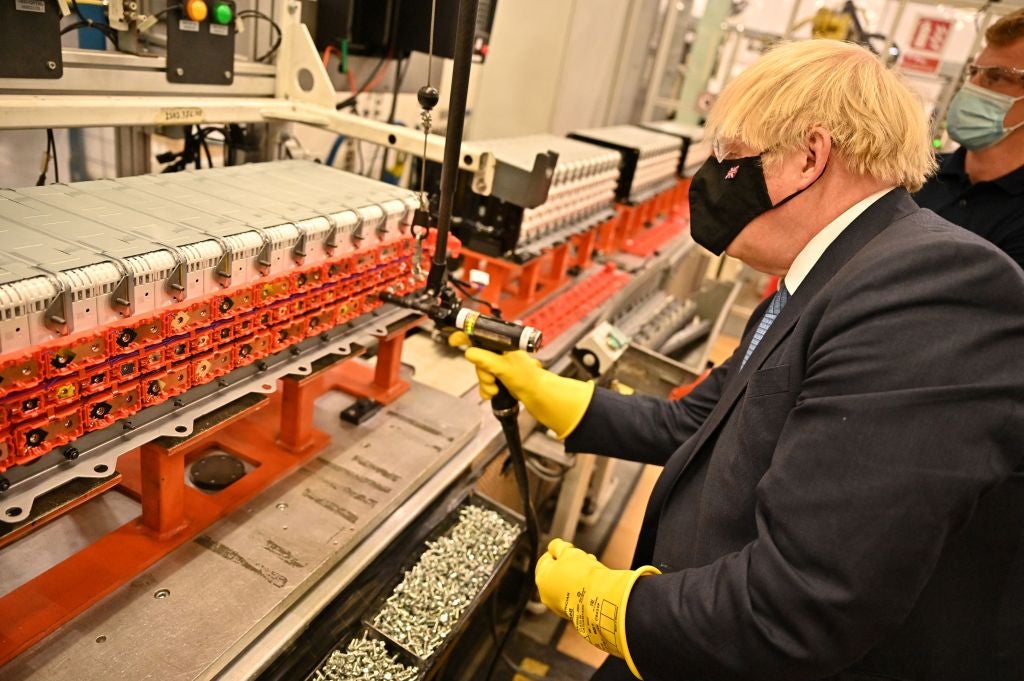Our obsession with gigafactories is not a good thing – Nissan should focus on smaller, lighter vehicles
Please send your letters to letters@independent.co.uk

The industry’s increasing obsession with gigafactories, demonstrated by the recent move from Nissan, speaks again to range anxiety and the broader problem of electric vehicle (EV) battery scale.
The average car journey in the UK is just 1.5 miles. Yet car companies still insist on developing huge EVs to account for larger batteries – batteries that frankly wouldn’t be required if they just focused attention instead on making smaller, lighter vehicles, of which there is a clear demand.
If car companies stopped thinking about how to make a profit and started thinking instead about what their customers actually want, they’d be able to be much more innovative when it comes to their actual design, in turn enabling for lighter, more efficient models which get people where they need to go using much smaller batteries. This would not only be more cost-effective for the manufacturer and customer, but far more environmentally sustainable, which is what it’s all about.
Mark Simon
Chief technical officer, Page-Roberts Automotive
Spare parts
The implementation of the right to repair on Thursday is great news for consumers and the environment. However, while I applaud the government’s decision to guarantee consumers the right to make their white goods last longer, I can’t help thinking the same should be done for manufacturers.
The rapid pace of technological progress means that the components of industrial automation systems are often discontinued to make space for newer models. While the availability of more advanced tech is certainly a good thing, it also means that equipment that is supposed to last for decades contains components that can be found on the market for only a couple of years. This causes premature obsolescence and forces manufacturers to costly and unnecessary upgrades to their production lines – in other words, they may be forced to replace perfectly good machines only because a few components have been discontinued.
Take semiconductors, for example. In the 1970s and 1980s, many models were in production for 25 to 40 years. Today, a semiconductor’s production life can be as short as two years. The same is true of all industrial technology, from motors to servo drives.
In 2019, the UK ranked as the world’s second-largest producer of waste electrical and electronic equipment (WEEE). If we want to change this, we can’t disregard the role of the manufacturing sector, one of the UK’s most flourishing industries. By making industrial spare parts readily available to manufacturers, we can give them the chance to help the environment while benefiting their bottom line.
Jonathan Wilkins
Director of EU Automation
Humane education
The fear and pain the nine cats killed in Brighton is unimaginable. People who pick on the defenceless – whether a cat, a child, or any other vulnerable being – are dangerous and need to be stopped before they can cause further harm.
Research in the fields of psychology and criminology informs us that time and time again, individuals who commit acts of cruelty to animals can go on to hurt humans if they aren’t apprehended and given the help they need.
Peta implores the courts to impose the maximum sentence for these types of crimes, including prison time, therapy, and a lifetime ban on keeping animals.
Of course, it would be much better if we could prevent animals from being abused in the first place. We could make great progress towards stopping future instances of abuse by requiring humane education in schools.
Children who learn to consider the feelings and rights of others – to see the us in them – stand a good chance of growing into kind, benevolent adults and peaceful community members.
Jennifer White
Peta Foundation
Rebuilding the country
The result of the Batley and Spen by-election was not a victory of Labour. It was a victory for the common decency of the British people. The electorate upheld that fundamental and most enduring character of the British people and returning Labour was the only way to do that, telling George Galloway to take his nasty politics off their streets.
The by-election was never about Keir Starmer or the Labour Party let alone about Palestine or Kashmir. It was about not being diverted from the pressing task of rebuilding the country after the pandemic.
Fawzi Ibrahim
London
Princess of Wales
Far from being a party-pooper, might I, respectfully, point out that in the 1980s when the media kept referring to her as “Princess Diana”, that I wrote the palace, and the then press officer, Michael O’Shea, wrote back to confirm that “[Her Royal Highness], Diana, Princess of Wales” is the only correct title.
Admittedly, the “Her Royal Highness” part was withdrawn later, but the misnomer has carried on.
Martin Levin
London
Join our commenting forum
Join thought-provoking conversations, follow other Independent readers and see their replies
Comments